The Crucial BX200 (480GB & 960GB) SSD Review: Crucial's First TLC NAND SSD
by Billy Tallis on November 3, 2015 9:00 AM ESTPerformance Consistency
Starting things off, our performance consistency test saturates the drive with 4kB random writes for a full hour, with a queue depth of 32, the maximum supported by the AHCI protocol used by SATA and most PCIe drives. This puts the drive's controller under maximum stress and writes enough data to exhaust all free space and spare area on the drive. This is an unrealistic workload for any client use, but it provides a worst-case scenario for long-term heavy use, and it sheds light on how different SSD controllers behave and if their performance will hold up as they fill up.
The average of the last 400 seconds of the test gives us a steady-state IOPS rating that is usually very different from what the manufacturer specifies for a new, empty drive. We also quantify the consistency of the drive's random write performance, and provide plots of the performance over the course of the test.
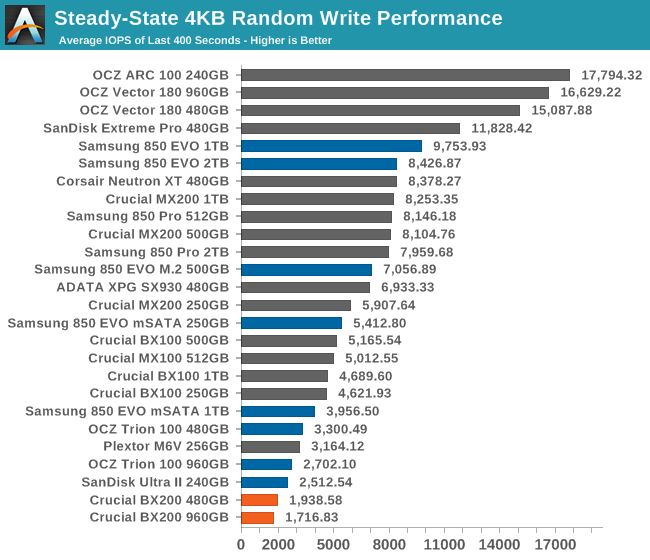
The BX200 is off to a poor start, with very low steady-state IOPS where the BX100 managed to place closer to the middle of the pack.
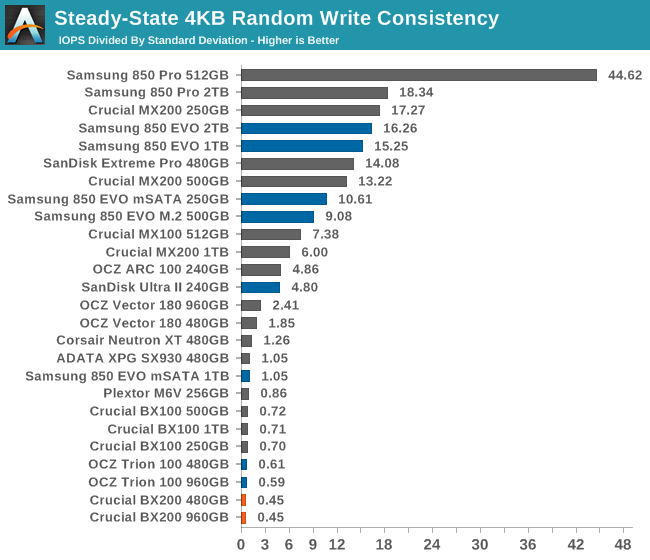
The BX200's consistency is also at the bottom of the chart, indicating that there's wide variability between its best and worst performance even after entering steady-state.
For a brief moment, the BX200 performs almost as advertised, and then for a few minutes it performs well for a budget drive, but when it runs out of cache and spare area, performance hits the floor.
Save for the periodic but infrequent excursions to 9k IOPS and 20-25k IOPS, the BX200's steady-state hovers between 200 and 700 IOPS: better than a hard drive, but not what we want to see from a SSD.


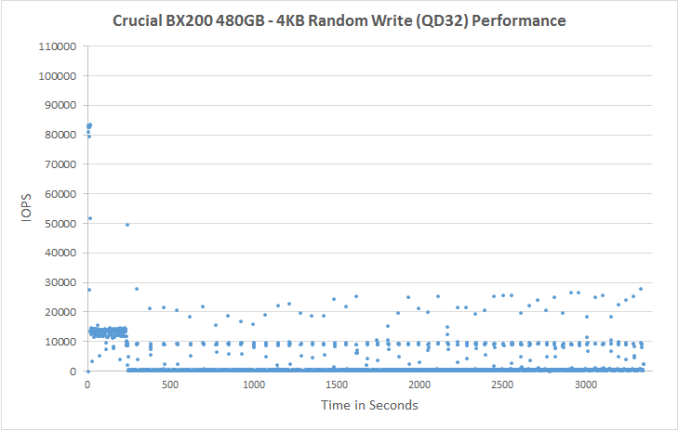
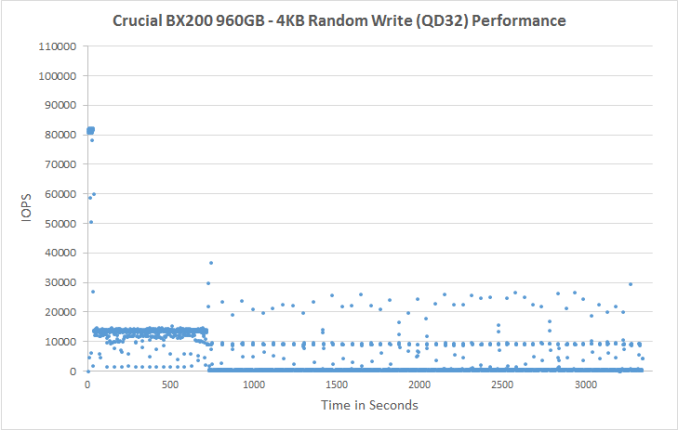
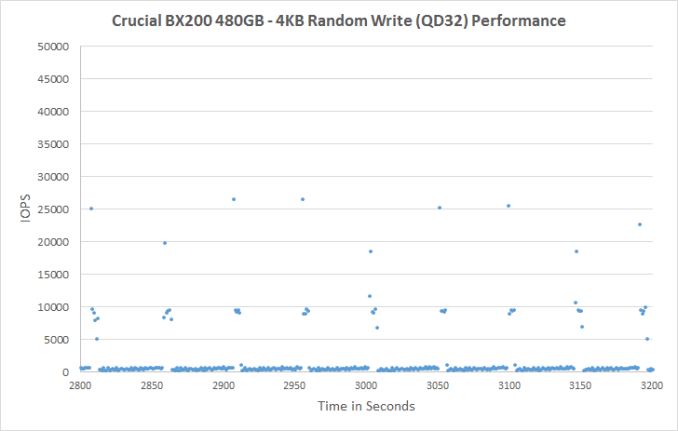
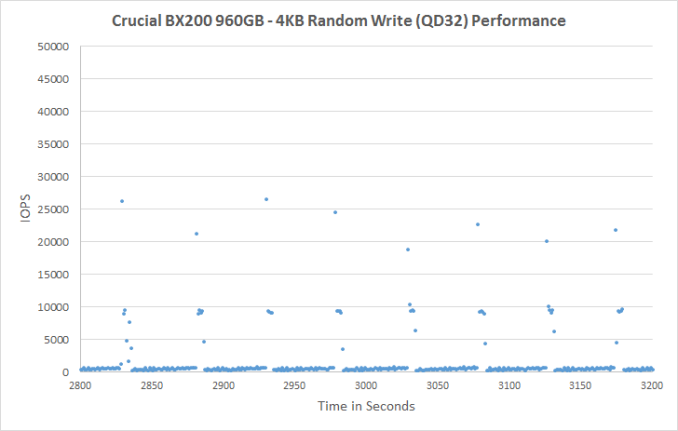








85 Comments
View All Comments
Shadow7037932 - Tuesday, November 3, 2015 - link
That's kind of disappointing, esp. the 250GB version as it's only a little cheaper than the 850 EVO. However, the 960GB assuming sales/deals, go down to $230-250 in the coming months, I can see people buying it to replace HDDs for say storing games.eek2121 - Tuesday, November 3, 2015 - link
That's MSRP for the BX200. The street prices will probably be much cheaper.Samus - Tuesday, November 3, 2015 - link
For the price your still better off with the OCZ ARC100 with toshiba MLC and. Barefoot3 controller.LB-ID - Tuesday, November 3, 2015 - link
Toshiba's still selling things under the OCZ name? It long since needed to die and go away.Lazlo Panaflex - Friday, November 6, 2015 - link
+1 to that. Lots of people got burned by bad OCZ drives. Pretty dumb of Toshiba to keep calling them that.tamalero - Thursday, November 12, 2015 - link
Reminds me of Hitachi when they bough the IBM dextar drives.anyone remembers the horrible failures of the 10k and 15k rpm drives under IBM?
even their consumer disks were dying like mad.
They sold their business to Hitachi who fixed the mess.
did this happen to Toshiba and the OCZ drives?
leexgx - Tuesday, November 3, 2015 - link
the poor power use on that drive is very bad (why i got the BX100 as it has overall best lowest power usage under almost all loads) BX100 is not the fastest SSD drive around but BX200 for £10 more is not good, same with the MX200 as wellcoconutboy - Tuesday, November 3, 2015 - link
For several months now, on a near-weekly basis, Samsung Evo drives are hitting sale prices of ~$150 for 500GB and $75 for 250GB. Except for customers not paying attention, Crucial is gonna have a tough time moving these bx200 when there's unproven reliability, almost no price advantage, and a huge performance deficit.Crucial needs to drop their msrp or cut retailers a deal to lower street prices.
eek2121 - Tuesday, November 3, 2015 - link
You are comparing MSRP to street prices. Most of the SSDs in that list are running at least $20 (and sometimes much more) below MSRP. I'm betting $0.25-$0.27 per gig once these things see widespread availability. Don't be surprised if this drive causes price brackets to move again. 480/512 where the 256 was, 960/1tb where the 512 was, etc.The_Assimilator - Tuesday, November 3, 2015 - link
It bloody well *better* move price brackets, since it's apparently not good for much else.